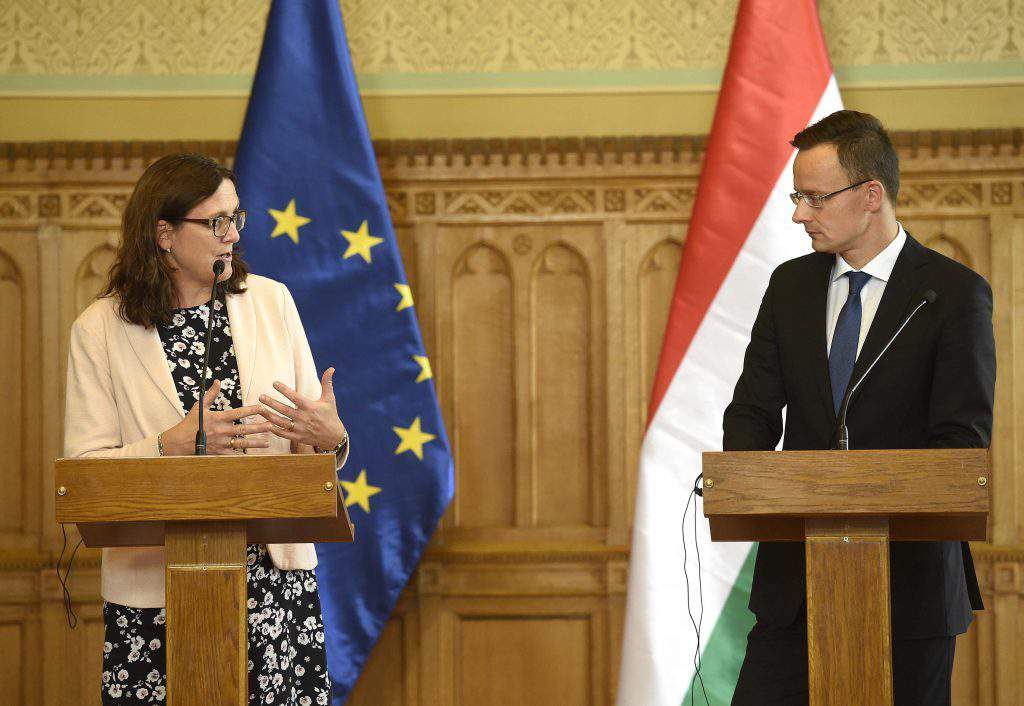Szijjártó comments CETA, TTIP in talks with EU trade commissioner

Budapest, September 26 (MTI) – Hungary’s government will seek parliament’s position on the subject of a free trade agreement with Canada (CETA) before deciding on whether to support it, Foreign Minister Péter Szijjártó said on Monday after talks with Cecilia Malstrom, the European Union’s trade commissioner.
Brussels must formulate an official position on this issue by October 18, he noted at a press conference. He said Canada is an important trading partner for Hungary and Canadian investments play an important role in the national economy, too.
On the subject of a free trade agreement with the United States (TTIP), Szijjártó said it was premature to talk about “something which only exists in negotiations”.
Hungary is an open economy which depends heavily on exports and its ability to attract investments, Szijjártó said. The EU currently has 37 free trade agreements and it is negotiating 20 others, he said, adding that it was welcome that the EU is open to attracting external partners.
Hungary has a few “red lines”, namely staying free of GMO products, which is laid down in its constitution. Hungary’s GMO-free stance has been made clear in connection with negotiations on the TTIP and the CETA, and the latter would guarantee that GMO-free status can be maintained, he said.
Because of NAFTA (the US-Canada-Mexico trade pact), European companies are at a disadvantage on North American markets, he said. It is in Hungary’s interest to compete there on equal terms, he added. Another agreement, the TPP, between 12 Pacific countries under the leadership of the United States, also excludes Europe, Szijjártó noted.
A decline in European competitiveness affects Hungary’s open economy acutely, but some national interests are key, such as the GMO issue. he said.
Malstrom said she trusted Hungary would support CETA as this would bring “immediate economic benefits” for Hungary. She said there is a growing consensus on the pact and it is hoped it can be signed in October. As for the TTIP, she said efforts were being made to speed up negotiations which would be continued under the next US presidency.

István Mikola, state secretary at the foreign ministry, said that Hungary needed free trade agreements so as not to be excluded from any world market.
Addressing a forum with Malstrom in the Budapest Business School, Mikola called CETA a good pact that is in the making after five years of hard bargaining.
Malstrom said the free trade agreements enable Europe to shape economic globalisation rather than passively suffering from it.
The ruling Fidesz party said that a decision would be made at next week’s meeting of the party’s parliamentary group on whether or not to back the CETA pact. Gergely Gulyás, the deputy group leader, said the party had not yet established a unified standpoint on the matter. Fidesz also awaits the opinions of opposition parties, he told journalists.
He said there were several points of vital importance on which a reassuring answer was needed before the party could lend its support to the agreement. Among them are the issue of legal authority when it comes to settling disputes and the question of GMOs.
The opposition LMP party accused the EU of involving multinational companies in free trade agreements and only listening to the voices of member states and its citizens after they make protests. Erzsébet Schmuck, the party’s parliamentary group leader, noted after a meeting of parliament’s trade committee attended by Malstrom that LMP had been an ardent critic of the TTIP agreement and had lobbied the prime minister to withhold his support for it.
Schmuck said Europeans are less and less satisfied with the prospect of such trade pacts, since they feel it is “not on their behalf” that the EU is signing them. Malstrom “must sense this uncertainty”, as she is visiting Hungary and other member states to discuss the subject, she added.
Photos: MTI
Source: MTI







